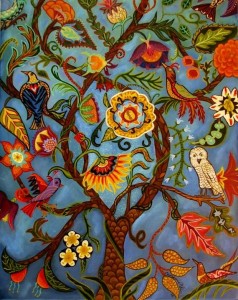Dear Integral Meditators,
The article below focuses on how you can develop the art of mindful self-confidence in a systematic, multi-faceted manner, I hope you enjoy it!
Toby
 How to Mindfully Develop Your Self-Confidence
How to Mindfully Develop Your Self-Confidence
Why focus on self-confidence?
How many things in your life would you be doing differently if you were thinking and acting from a place of deep self confidence? The capacity for authentic self-confidence offers many benefits, for example we become more creative and expressive, we find access to greater capacity for focus, mental stamina and energy, we experience greater peace of mind, we experience life as fundamentally enjoyable and playful.
What is self-confidence?
We will all have our own ideas of what self-confidence is, but the definition I normally work with (following Nathaniel Branden’s definition of self-esteem) is that self –confidence consists of two distinct parts:
- Self-worth – The belief that I am worthy of happiness, pleasure, enjoyment, wellbeing, success & so on and
- Self-efficacy – The sense that I have the capacity be successful in the face of life’s challenges. Even if I currently lack the skills to be successful in a particular task, self-efficacy is a confidence in my ability to learn those skills as and when necessary
If you lack a fundamental sense of your self-worth or your capacity for self-efficacy, then your self-confidence is going to be built upon shaky ground!
Mindful methods for developing your self-confidence
With the above definitions in mind, we can then start t adopt a multi-faceted approach to developing self-confidence, here are a few suggestions:
1. Connect and nourish your present self confidence – No one completely lacks self confidence, look for times and places in your life where you have felt and experienced self confidence. Revisit them mentally, take an inventory of them, recall how it felt. Then look at how you can translate those experiences into feelings and attitudes of self-confidence in the face of your present life challenges.
2. Know what self-confidence feels like in the body – Practice holding your body and feeling it in a way that communicates confidence and self assurance to your mind. Our posture is often communicating all sorts of messages to us psychologically, so we need to take advantage of this rather than being victimized by it!
3. Make friends with the parts of you that are not self-confident – As the famous gestalt therapist Fritz Pearls said ‘As long as you fight a symptom it will get worse’ (I recommend meditating on that sentence for a looong time!) Open to and get intimate with your fears, your vulnerabilities, the parts of you feel fragmented. Care for them, experience them, open to them, allow them to become the basis of your self-confidence, rather than the things you are trying to escape from by developing your self-confidence. This needs careful thought, reflection and experience to understand, but it is super-important to get right!
4. Find role models for your self confidence – Find real life examples of people who are appropriate and inspiring role models for the type of self-confidence you want to have. Study them carefully and draw conscious inspiration from them.
5. Do something each day to engage your self-confidence – Do something manageable each day to test and develop your self confidence experientially and in real time.
6. Practice mindful framing – ‘Last month I was depressed, and this month I’m still depressed’ sounds like a bit of a failure. ‘Last month I was very depressed and although this month I am still depressed I feel less depressed, and there have been days when I have actually felt good’ Sounds like progress and a cause of boosting our self-confidence. How we frame what happens to us mentally is crucial in terms of whether we experience something as supporting our self-confidence or not!
Conclusion
If you wanted to make this article a practical exploration, you could take one of the above six suggestions per day as a point of mindful focus for the next three weeks or so (taking one day off to give you three rounds over three weeks). See where it takes your own experience of mindful self-confidence!
Related articles: Choosing to be on your own side
Trusting your mind
Free audio meditation on self-trust
Stress Transformation Coaching with Toby
Tuesday 21st April, 7.30-9.30pm – An Evening of Mindful Self-Confidence – Developing your self-confidence, self-belief & self-trust through mindfulness & meditation
© Toby Ouvry 2015, you are welcome to use or share this article, but please cite Toby as the source and include reference to his website www.tobyouvry.com
Integral Meditation Asia
Life-Coaching * Meditation Technology









